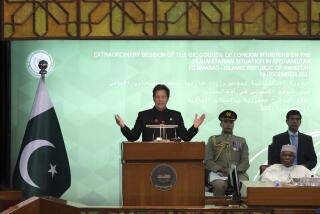U.S. to Train Afghan Forces, Bush Pledges
WASHINGTON — The United States will help Afghanistan develop its national army and train its police forces, President Bush said Monday as he met for the first time with Hamid Karzai, the head of the Afghan interim government.
Bush’s pledge deepened his administration’s commitment to rebuild a country ravaged by 23 years of war and rebellion--and most recently by U.S. military strikes that crumbled the ruling Taliban regime and uprooted the Al Qaeda terrorist organization.
But the president made clear he had not budged from his insistence that other nations provide the troops for a peacekeeping force in Afghanistan, despite Karzai’s hope that the U.S. military would take part.
“Better yet than peacekeepers, let’s have Afghanistan have her own military,” Bush said. He termed that “the most important part of this visit.”
The White House also offered new details of U.S. humanitarian assistance for Afghanistan, released assets that had been frozen during the Taliban rule and extended credit to encourage private investment.
Karzai, who is interim prime minister, said he would return home “satisfied” with the results of his U.S. trip. He also vowed that “we will not allow terrorism to return” to Afghanistan.
Along with the visit to the White House, Karzai’s schedule in Washington was crowded with events to strengthen support for his nation and reestablish its ties with the United States.
Karzai spoke to students and supporters at Georgetown University on Sunday night and sat for at least three television interviews Monday. He also witnessed the raising of the Afghan flag at his nation’s recently reopened embassy here.
He plans to meet today with the House International Relations Committee and then attend a program on U.S. assistance for education in Afghanistan. First Lady Laura Bush and the head of the U.S. Agency for International Development are scheduled to attend the latter event.
Karzai also is expected to be in the gallery tonight when Bush delivers his State of the Union address to a joint session of Congress.
During a news conference with Karzai in the Rose Garden, Bush noted that for the first time since 1979 an American flag flies over the offices of the U.S. Agency for International Development mission in Kabul, the Afghan capital.
“That flag will not be lowered,” the president said. “It will wave long into the future, a symbol of America’s enduring commitment to Afghanistan’s future.”
But the precise nature of Bush’s commitment to help Afghanistan establish its military and police forces remained uncertain. White House officials said no details had been worked out.
For more than a generation, the military role in Afghanistan has been played by competing militias controlled by warlords whose allegiances were often shifting and, more recently, by troops commanded by the Taliban.
Bush said the U.S. will offer logistical support for the international peacekeepers and assistance in gathering intelligence. He also said American forces stood ready to provide “a kind of a bailout if the troops get in trouble.”
In opposing a U.S. peacekeeping role, Bush has argued that American troops are equipped and trained to fight wars and then head home to stand ready for their next engagement. In addition, the Bush administration says the Pentagon’s forces, stretched as they are, need to be prepared for future assignments in the anti-terror campaign.
In an interview on PBS, Karzai said Afghanistan would like the multinational peacekeeping force--now made up of about 5,000 soldiers, led largely by British units and operating in Kabul--to play an expanded role. He called for deploying troops throughout the country to demonstrate an international commitment to security.
In a joint statement, Bush and Karzai also committed their countries to “a lasting partnership for the 21st century.”
The administration has already pledged $297 million in aid to Afghanistan. On Monday, the U.S. announced that it had released $223 million in frozen Afghan assets. Bush also said the Overseas Private Investment Corp. will make a $50-million line of credit available to companies wanting to invest in Karzai’s nation.
U.S. assistance will be provided to print and distribute 10 million math, science and reading textbooks in time for the start of the Afghan school year in March, to provide basic training for 4,000 teachers and to vaccinate 2.2 million children against measles, the White House said.
Karzai has displayed a keen understanding of the workings of the U.S. government, recognizing that while the White House largely controls foreign and military policy, Congress holds sway over financial aid.
Even before his U.S. visit, Karzai courted members of Congress, meeting in Kabul with several delegations. Among the lawmakers was Rep. Jim Kolbe (R-Ariz.), chairman of the House Appropriations subcommittee on foreign operations, who helps shape the $15-billion international aid budget.
“Karzai is a very dynamic individual, kind of the right guy at the right time for that country,” Kolbe said. “He can talk--literally and figuratively--our language.”
*
Times staff writer Nick Anderson contributed to this report.
More to Read
Sign up for Essential California
The most important California stories and recommendations in your inbox every morning.
You may occasionally receive promotional content from the Los Angeles Times.










